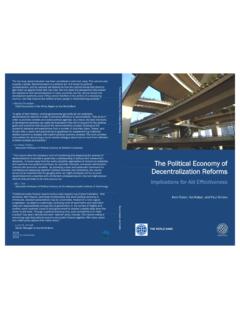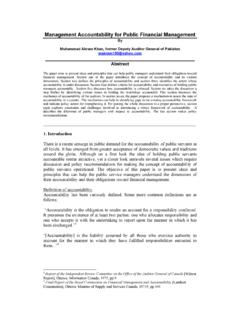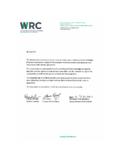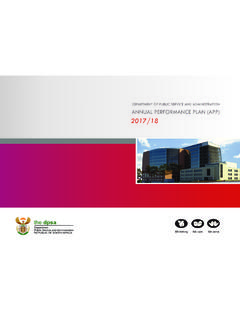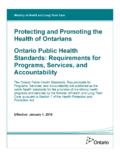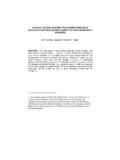Transcription of Managing Records as the Basis for Effective Service ...
1 Managing Records as the Basis forEffective Service delivery and PublicAccountability in Development:An Introduction to Core Principlesfor Staff of the World Bank and Its PartnersJuly 2000 TheWorldBankInternationalRecordsManageme ntTrustWBP,4700 CONTENTSI ntroduction1 Section 1 Recognizing Records as a Strategic Resource2 Record Keeping and Accountability2 The Collapse of Record Keeping Systems7 Why Do Records Continue to Be Neglected?9 Electronic Governance and Electronic Records11 Section 2 Principles of Records and Archives Management15 What Are Records ?15 Who Uses Records ? 16 Principles of Records and Archives Care 17 Section 3 Developing a Strategic Approach for Managing Records18 Records , Archives, and Information Management18 Integrated Records and Archives Management20 Key Stages in Developing an Integrated Records andArchives Management Program23 Section 4 Developing a Legal and Regulatory Infrastructure forRecords and Archives Management27 Reviewing and Revising Records Legislation27 Reviewing and Revising National Policies 32 Organizational Policies and Structures 33 Determining Resource Requirements 35 Developing a Strategic Plan 36 Supporting and Sustaining an Integrated Records andArchives Management Program 37 Section 5 Key Activities in Records and Archives Management39 Organizing and Controlling Records 39 Appraising and Disposing of Records 42 Providing Physical Protection for Records43 Managing Records in Records Centers44 Managing Archives 44 Section 6 Management of public Sector Records Study Program461 WBP.
2 4700 INTRODUCTIONINTRODUCTIONThe sections which follow examine the importance of good record keeping within thepublic sector and explore the need to manage information as a strategic resource. Theyoutline the purpose of Records and archives management; define the key terminology,theories, and principles underpinning Records and archives care; and present a rationalefor developing an integrated Records management program. They review the legal andregulatory infrastructure for Records and archives and conclude by outlining the keyactivities undertaken in Records and archives management. A toolkit for assessingrecords management capacity can be found at: ,4700 SECTION 1 RECOGNIZING Records AS A STRATEGICRESOURCES ection 1 examines the importance of good record keeping for accountability . It alsodiscusses the significance of Records as evidence, particularly in relation tocomputerization and the creation of electronic KEEPING AND ACCOUNTABILITYR ecord keeping is a fundamental activity of public administration.
3 Without Records therecan be no rule of law and no accountability . public servants must have information tocarry out their work, and Records represent a particular and crucial source of provide a reliable, legally verifiable source of evidence of decisions and document compliance or non-compliance with laws, rules, and procedures. Governments can no longer justify taking action with little or no reference to pastperformance or future goals. Nor can they justify parallel or duplicate services when theycan combine services and reduce costs. Client Service , quality performance of tasks, andmeasurable outcomes are increasingly important responsibilities, and these aspirations alldepend on accessible and usable , in many countries around the world, record keeping systems are unable to cope withthe growing mass of unmanaged Records . This is particularly true in countries with limitedfinancial or administrative resources or where Records and archives managers lack trainingor professional development opportunities.
4 Administrators find it ever more difficult toretrieve the information they need to formulate, implement, and monitor policy and tomanage key personnel and financial resources. This situation impedes the capacity to carryout economic and administrative reform programs aimed at achieving efficiency, accountability , and enhanced services to citizens. Moreover, the decline, and in somecases total collapse, of record keeping systems makes it virtually impossible to determineresponsibility for actions and to hold individuals loss of control of Records has consequences for all citizens, especially for the poorestwho are least able to defend themselves. Relevant and accurate public Records areessential to preserving the rule of law and demonstrating fair, equal, and consistenttreatment of citizens. Without access to Records , the public does not have the evidence3 WBP,4700needed to hold officials accountable or to insist on the prosecution of corruption andfraud.
5 Moreover, the public suffers when inadequate information systems affect thedelivery of programs. All aspects of public Service , including health, education,pensions, land, and judicial rights, depend upon well-kept and well-managed are vital to virtually every aspect of the governance process. The effectivenessand efficiency of the public Service across the range of government functions dependsupon the availability of and access to information held in Records . Badly managedrecords adversely affect the broad scope of public Service reforms, and developmentprojects are often difficult to implement and sustain effectively in the absence of wellmanaged Records . The relationship between key governance objectives and the recordsrequired to support them is illustrated OBJECTIVEKEY Records REQUIRED rule of lawlegislative recordscourt recordspolice recordsprisons Records accountability accounting recordsprocurement recordstax recordscustoms recordselectoral registerspolicy filescase files management of state resources budget paperspolicy filesaccounting recordspersonnel recordspayroll recordsprocurement recordsfixed assets registersproperty registers protection of entitlements pension recordssocial security recordsland registration recordsbirth/death Records 4 WBP.
6 4700 GOVERNANCE OBJECTIVEKEY Records REQUIRED services for citizens hospital recordsschool recordsenvironmental monitoring Records foreign relations and internationalobligations treatiescorrespondence with national andinternational bodiesloan agreements Governance Objectives and Records Record keeping is essential to virtually all development objectives as discussed below. Human Rights The ability of governments to protect the rights of its citizens and to improvecitizen-government interaction is a critical issue. The rights and entitlements of citizensare based on Records , and the ability of a government to continue to respect these rightsand entitlements is based on the quality of the policies, standards, and practices employedfor the care of those Records . In an increasingly electronic environment, whereinformation is held in a fragile format, this is much more difficult to achieve than isusually realized.
7 Governance and accountability Governments are being asked to be transparent, open, and engaged with their citizens are becoming more concerned about their roles in the governance of thecountry. They want to be able to trust in their government, and they expect it to functionin a manner that engenders this sense of trust. Records , and the evidence they contain,are the instruments by which governments can promote a climate of trust anddemonstrate an overall commitment to good government. Similarly, accountability is critical to a responsible government. The foundation foraccountability is well-managed Records . When managed in a way that ensures integrityand authenticity through time, Records allow employees to account to their permit managers to account to the heads of government institutions and they helpthe heads to account to elected officials and others who represent the interests of ,4700 Anti-Corruption The loss of control of financial Records creates opportunities for fraud, leads to loss ofrevenue, and impedes fiscal planning.
8 It makes it difficult, if not impossible, to preservean audit trail of decisions, actions, and transactions. The consequences are particularlyapparent in the procurement of goods and works. Well managed Records provide acost- Effective deterrent to fraud and corruption. Records systems provide controls onaccess to Records ; track the movement of Records through the organization; and providereliable and authentic audit trails which demonstrate an unambiguous link between anauthorization, an individual s actions, and a date. They can serve as evidence to identifyabuse, misuse, and non-compliance with financial instructions and other laws andregulations. Without well-managed Records anti-corruption strategies are impaired. Management of Human Resources Improved human resource management is central to good policy management ingovernment. Yet, in many countries paper-based personnel files are incomplete anddifficult to access.
9 Although public sector reform programs typically include asignificant reduction in the size of the public Service , governments are unable to find thebasic information needed to accomplish this task, such as accurate staff numbers, detailsof their grades, and location or dates of appointment. Moreover, as governments focus attention on improving the incentive structure of thecivil Service , the need for accurate and complete Records becomes more critical. Forexample, performance-related human resource management designed to reward themost competent staff and penalize poor performers is dependent upon informationabout the present and past performance of individuals. This information is not accessibleif the relevant Records cannot be located. Computerization will undoubtedly facilitate the retrieval of personnel information. At thesame time, unless there is a very well developed capacity to manage electronic Records aslegally verifiable evidence of entitlements, contractual obligations, policies, ortransactions for the period required, a mixed media, paper/electronic, human resourceinformation system is essential.
10 6 WBP,4700 Payroll Control In many countries, government payrolls have been inflated with ghost workers :non-existent employees who draw a salary, taken by someone else. The personnel fileshould be the primary source of evidence that a person actually exists, that the grade isappropriate to the salary paid, and that any additional benefits are appropriate and havebeen authorized. In the absence of complete personnel files, the ghost workers problem cannot beaddressed in a sustainable manner. Entries on the payroll database cannot be checkedagainst an authoritative source to ensure that the person actually exists and that paymentshave been authorized. Head counts and questionnaires provide a temporary solution, butrecords are an essential aspect of the long term solution. Financial Management Good record keeping is essential to clear and accountable financial accurate Records of actual expenditures, the process of preparing budgets canbecome almost meaningless.

